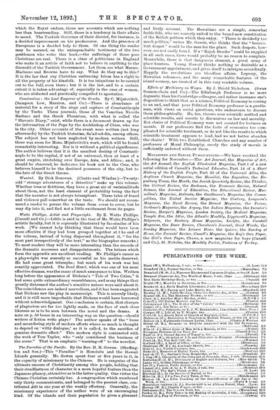Watts Phillips, Artist and Playwright. By E. Watts Phillips. (Cassell
and Co.)—Little is said in the text of Mr. Watts Phillips's artistic faculty, but it is copiously illustrated by fac-similes of his work. (We cannot help thinking that these would have been more effective if they had been grouped together at t he end of the volume, instead of being dispersed throughout it, "for the most part irrespectively of the text," as the biographer remarks.) To most readers they will be more interesting than the records of the dramatic successes and disappointments. The letters which form the appendix are excellent reading. Mr. Phillips's career as a playwright was scarcely as successful as his merits deserved. He had some great triumphs ; but much of his work was but scantily appreciated. The Dead Heart, which was one of his most effective dramas, was the cause of much annoyance to him. Written long before the appearance of Dickens's "Tale of Two Cities," it had some quite extraordinary resemblances, and many things that greatly distressed the author's sensitive nature were said about it. The coincidences are indeed marvellous, and it has been suggested that Dickens saw the play in manuscript. This is scarcely likely, and it is still more improbable that Dickens would have borrowed without acknowledgment. One conclusion is certain, that charges a plagiarism are far too lightly made, on the face of such close likeness as is to be seen between the novel and the drama. note on p. 50 bears in an interesting way on the question—should writers of fiction write plays ? The author speaks of the "loose and meandering style of modern efforts where so much is thought to depend on • witty dialogue,' as it is called, to the sacrifice of genuine dramatic effect." This modern style is contrasted with the work of Tom Taylor, who "only considered the business of the scene." That is an emphatic "warning-off to the novelist.






































 Previous page
Previous page